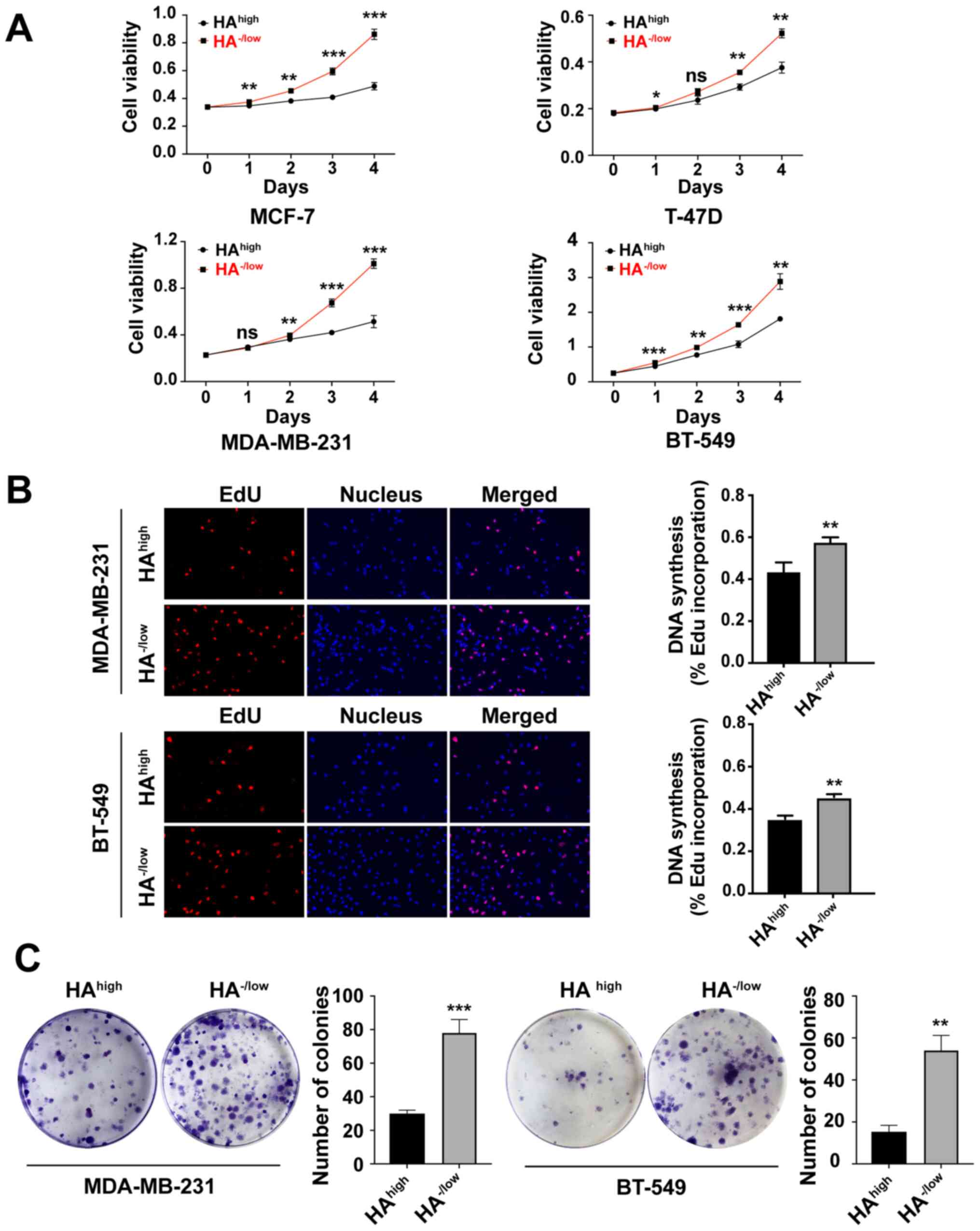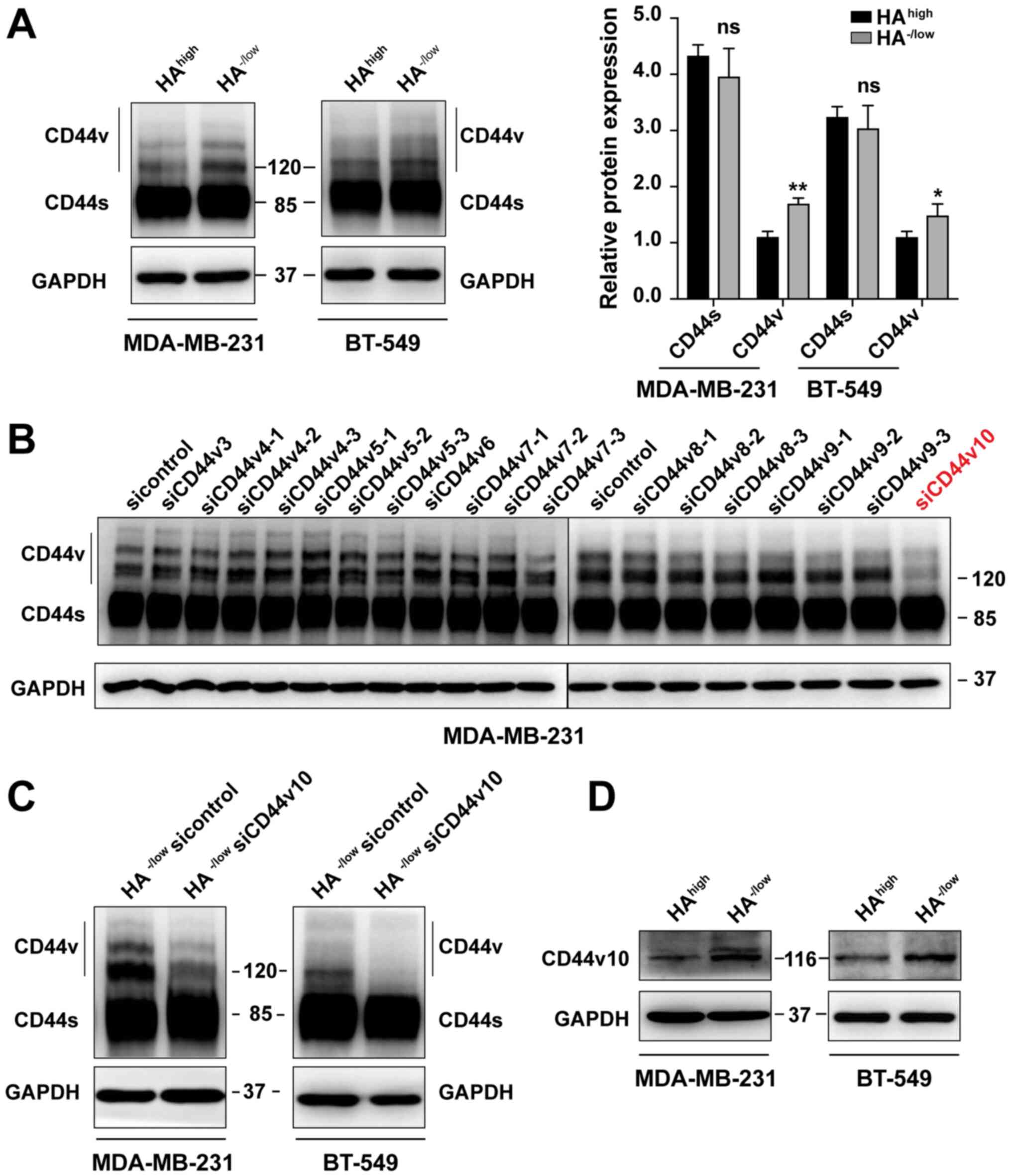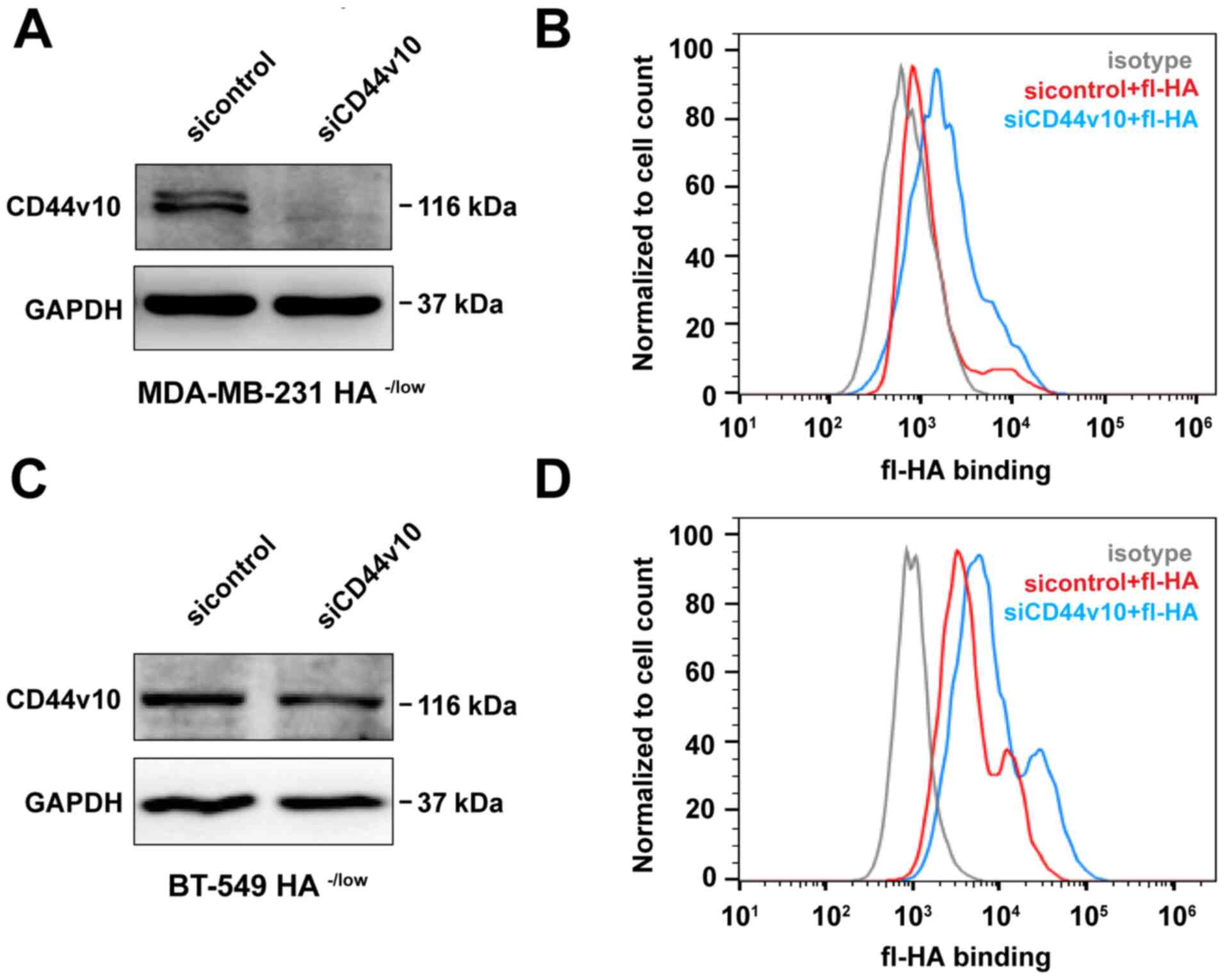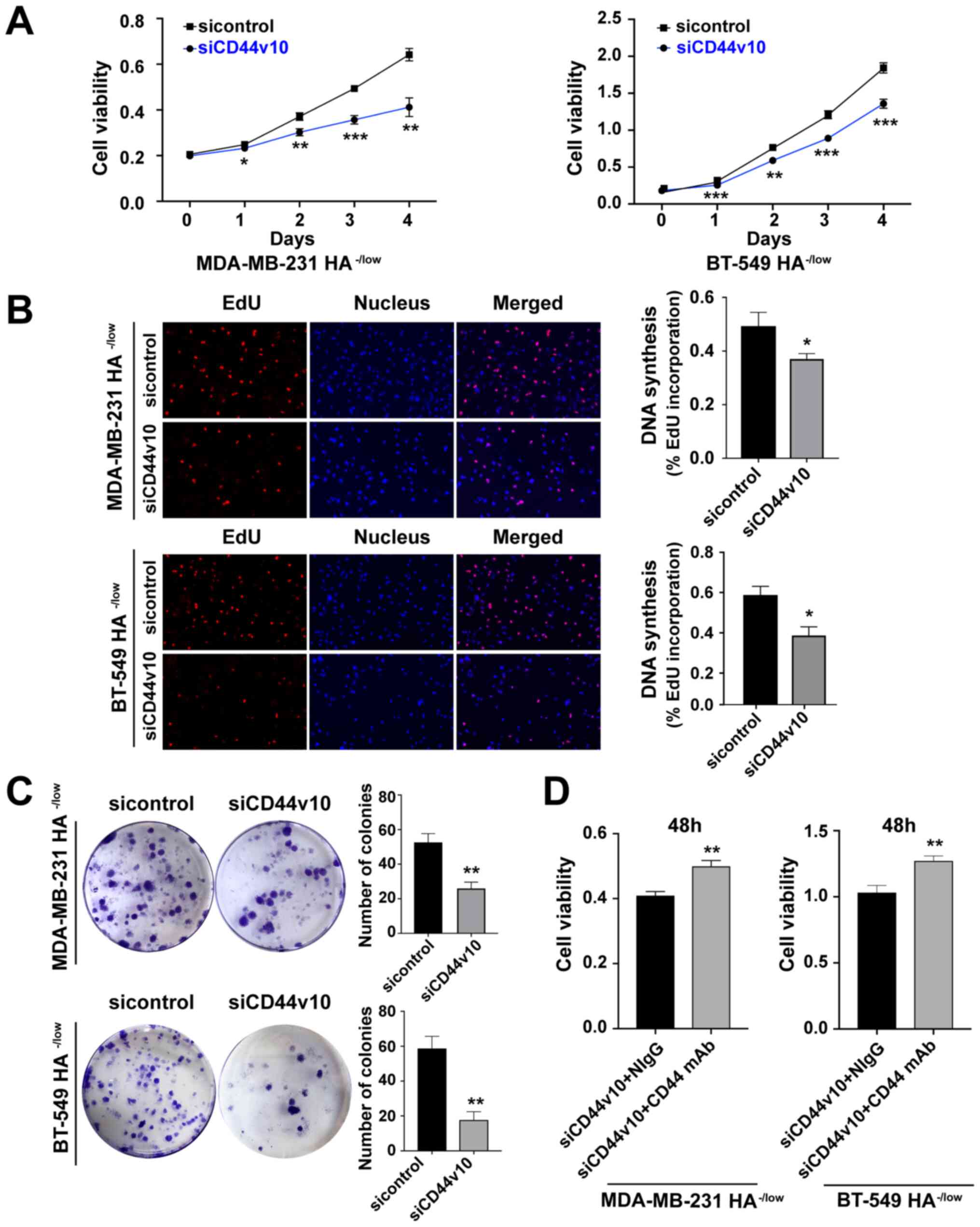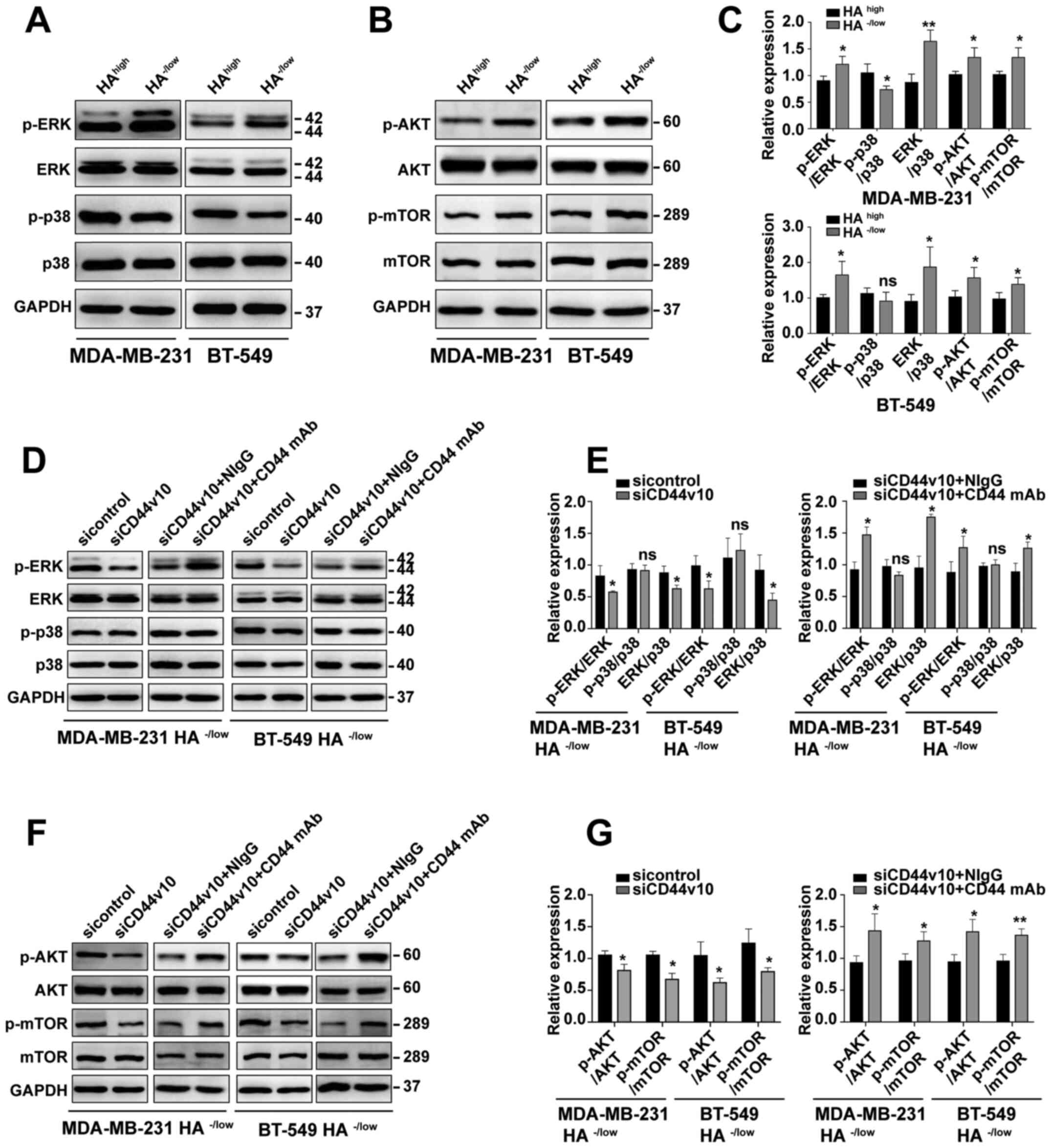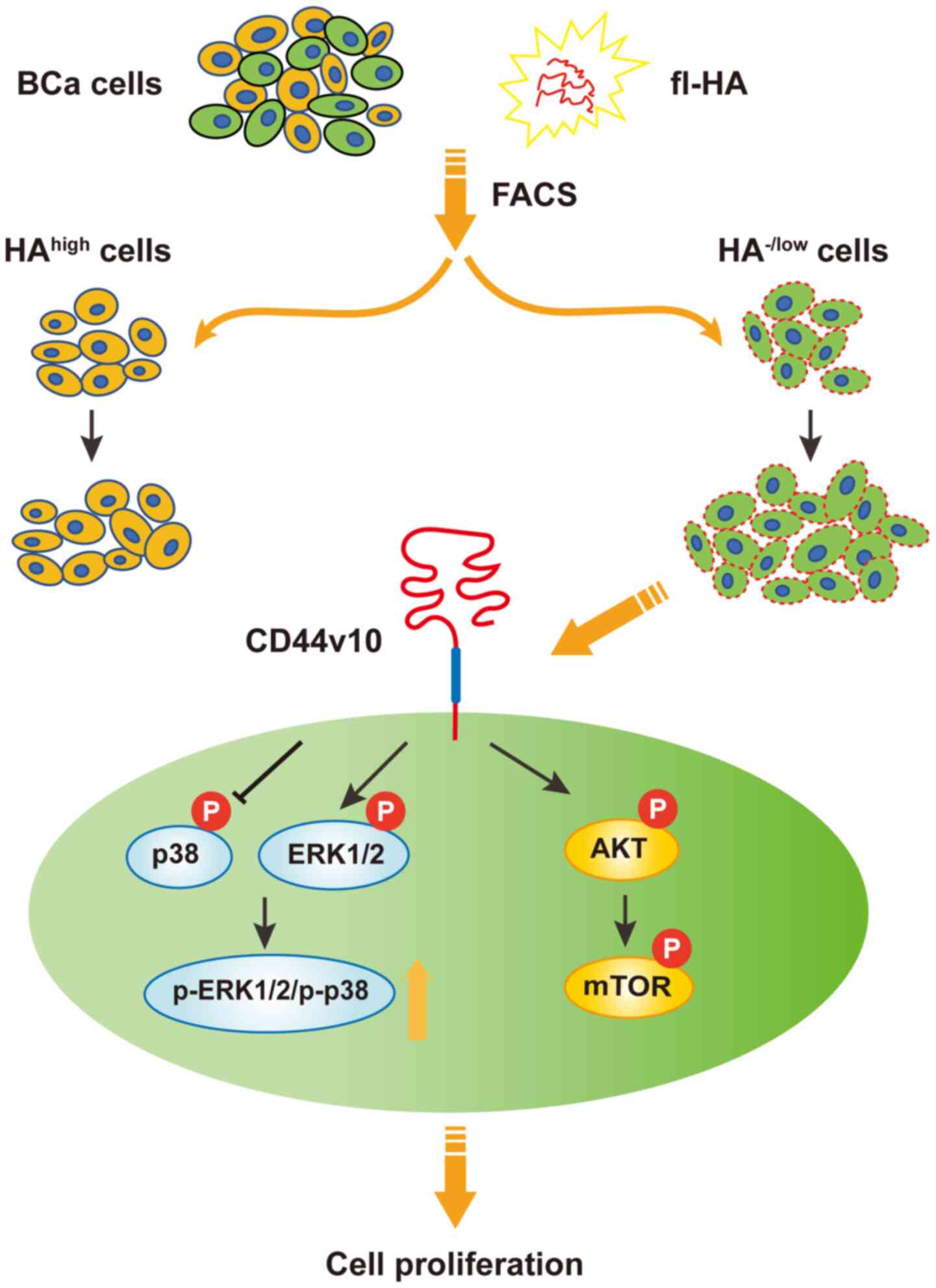|
1
|
Bray F, Ferlay J, Soerjomataram I, Siegel
RL, Torre LA and Jemal A: Global cancer statistics 2018: GLOBOCAN
estimates of incidence and mortality worldwide for 36 cancers in
185 countries. CA Cancer J Clin. 68:394–424. 2018. View Article : Google Scholar : PubMed/NCBI
|
|
2
|
Yeo SK and Guan JL: Breast cancer:
Multiple subtypes within a tumor? Trends Cancer. 3:753–760. 2017.
View Article : Google Scholar : PubMed/NCBI
|
|
3
|
Heldin P, Basu K, Kozlova I and Porsch H:
HAS2 and CD44 in breast tumorigenesis. Adv Cancer Res. 123:211–229.
2014. View Article : Google Scholar : PubMed/NCBI
|
|
4
|
Senbanjo LT and Chellaiah MA: CD44: A
multifunctional cell surface adhesion receptor is a regulator of
progression and metastasis of cancer cells. Front Cell Dev Biol.
5:182017. View Article : Google Scholar : PubMed/NCBI
|
|
5
|
DeGrendele HC, Estess P and Siegelman MH:
Requirement for CD44 in activated T cell extravasation into an
inflammatory site. Science. 278:672–675. 1997. View Article : Google Scholar : PubMed/NCBI
|
|
6
|
Chanmee T, Ontong P and Itano N:
Hyaluronan: A modulator of the tumor microenvironment. Cancer Lett.
375:20–30. 2016. View Article : Google Scholar : PubMed/NCBI
|
|
7
|
Toole BP: Hyaluronan-CD44 interactions in
cancer: Paradoxes and possibilities. Clin Cancer Res. 15:7462–7468.
2009. View Article : Google Scholar : PubMed/NCBI
|
|
8
|
Karousou E, Misra S, Ghatak S, Dobra K,
Götte M, Vigetti D, Passi A, Karamanos NK and Skandalis SS: Roles
and targeting of the HAS/hyaluronan/CD44 molecular system in
cancer. Matrix Biol. 59:3–22. 2017. View Article : Google Scholar : PubMed/NCBI
|
|
9
|
McDonald B and Kubes P: Interactions
between CD44 and hyaluronan in leukocyte trafficking. Front
Immunol. 6:682015. View Article : Google Scholar : PubMed/NCBI
|
|
10
|
Lesley J, Kincade PW and Hyman R:
Antibody-induced activation of the hyaluronan receptor function of
CD44 requires multivalent binding by antibody. Eur J Immunol.
23:1902–1909. 1993. View Article : Google Scholar : PubMed/NCBI
|
|
11
|
Ogino S, Nishida N, Umemoto R, Suzuki M,
Takeda M, Terasawa H, Kitayama J, Matsumoto M, Hayasaka H, Miyasaka
M, et al: Two-state conformations in the hyaluronan-binding domain
regulate CD44 adhesiveness under flow condition. Structure.
18:649–656. 2010. View Article : Google Scholar : PubMed/NCBI
|
|
12
|
Lesley J and Hyman R: CD44 can be
activated to function as an hyaluronic acid receptor in normal
murine T cells. Eur J Immunol. 22:2719–2723. 1992. View Article : Google Scholar : PubMed/NCBI
|
|
13
|
Hiraga T, Ito S and Nakamura H: Cancer
stem-like cell marker CD44 promotes bone metastases by enhancing
tumorigenicity, cell motility, and hyaluronan production. Cancer
Res. 73:4112–4122. 2013. View Article : Google Scholar : PubMed/NCBI
|
|
14
|
Hu S, Cao M, He Y, Zhang G, Liu Y, Du Y,
Yang C and Gao F: CD44v6 targeted by miR-193b-5p in the coding
region Modulates the migration and invasion of breast cancer cells.
J Cancer. 11:260–271. 2020. View Article : Google Scholar : PubMed/NCBI
|
|
15
|
Zhao P, Xu Y, Wei Y, Qiu Q, Chew TL, Kang
Y and Cheng C: The CD44s splice isoform is a central mediator for
invadopodia activity. J Cell Sci. 129:1355–1365. 2016. View Article : Google Scholar : PubMed/NCBI
|
|
16
|
Teriete P, Banerji S, Noble M, Blundell
CD, Wright AJ, Pickford AR, Lowe E, Mahoney DJ, Tammi MI, Kahmann
JD, et al: Structure of the regulatory hyaluronan binding domain in
the inflammatory leukocyte homing receptor CD44. Mol Cell.
13:483–496. 2004. View Article : Google Scholar : PubMed/NCBI
|
|
17
|
Liu D, Liu T, Li R and Sy MS: Mechanisms
regulating the binding activity of CD44 to hyaluronic acid. Front
Biosci. 3:d631–d636. 1998. View
Article : Google Scholar : PubMed/NCBI
|
|
18
|
Louderbough JM and Schroeder JA:
Understanding the dual nature of CD44 in breast cancer progression.
Mol Cancer Res. 9:1573–1586. 2011. View Article : Google Scholar : PubMed/NCBI
|
|
19
|
Naor D, Nedvetzki S, Golan I, Melnik L and
Faitelson Y: CD44 in cancer. Crit Rev Clin Lab Sci. 39:527–579.
2002. View Article : Google Scholar : PubMed/NCBI
|
|
20
|
Dougherty GJ, Cooper DL, Memory JF and
Chiu RK: Ligand binding specificity of alternatively spliced CD44
isoforms. Recognition and binding of hyaluronan by CD44R1. J Biol
Chem. 269:9074–9078. 1994. View Article : Google Scholar : PubMed/NCBI
|
|
21
|
Bennett KL, Modrell B, Greenfield B,
Bartolazzi A, Stamenkovic I, Peach R, Jackson DG, Spring F and
Aruffo A: Regulation of CD44 binding to hyaluronan by glycosylation
of variably spliced exons. J Cell Biol. 131:1623–1633. 1995.
View Article : Google Scholar : PubMed/NCBI
|
|
22
|
Sleeman J, Rudy W, Hofmann M, Moll J,
Herrlich P and Ponta H: Regulated clustering of variant CD44
proteins increases their hyaluronate binding capacity. J Cell Biol.
135:1139–1150. 1996. View Article : Google Scholar : PubMed/NCBI
|
|
23
|
Orian-Rousseau V: CD44 Acts as a signaling
platform controlling tumor progression and metastasis. Front
Immunol. 6:1542015. View Article : Google Scholar : PubMed/NCBI
|
|
24
|
Chen C, Zhao S, Karnad A and Freeman JW:
The biology and role of CD44 in cancer progression: Therapeutic
implications. J Hematol Oncol. 11:642018. View Article : Google Scholar : PubMed/NCBI
|
|
25
|
Liu S and Cheng C: Akt Signaling is
sustained by a CD44 splice isoform-mediated positive feedback loop.
Cancer Res. 77:3791–3801. 2017. View Article : Google Scholar : PubMed/NCBI
|
|
26
|
Yang C, Cao M, Liu H, He Y, Xu J, Du Y,
Liu Y, Wang W, Cui L, Hu J, et al: The high and low molecular
weight forms of hyaluronan have distinct effects on CD44
clustering. J Biol Chem. 287:43094–43107. 2012. View Article : Google Scholar : PubMed/NCBI
|
|
27
|
Zhang H, Brown RL, Wei Y, Zhao P, Liu S,
Liu X, Deng Y, Hu X, Zhang J, Gao XD, et al: CD44 splice isoform
switching determines breast cancer stem cell state. Genes Dev.
33:166–179. 2019. View Article : Google Scholar : PubMed/NCBI
|
|
28
|
Hu J, Li G, Zhang P, Zhuang X and Hu G: A
CD44v+ subpopulation of breast cancer stem-like cells
with enhanced lung metastasis capacity. Cell Death Dis.
8:e26792017. View Article : Google Scholar : PubMed/NCBI
|
|
29
|
Livak KJ and Schmittgen TD: Analysis of
relative gene expression data using real-time quantitative PCR and
the 2(-Delta Delta C(T)) method. Methods. 25:402–408. 2001.
View Article : Google Scholar : PubMed/NCBI
|
|
30
|
Lokeshwar VB, Iida N and Bourguignon LY:
The cell adhesion molecule, GP116, is a new CD44 variant (ex14/v10)
involved in hyaluronic acid binding and endothelial cell
proliferation. J Biol Chem. 271:23853–23864. 1996. View Article : Google Scholar : PubMed/NCBI
|
|
31
|
Aguirre-Ghiso JA, Estrada Y, Liu D and
Ossowski L: ERK(MAPK) activity as a determinant of tumor growth and
dormancy; regulation by p38(SAPK). Cancer Res. 63:1684–1695.
2003.PubMed/NCBI
|
|
32
|
Nan H, Han L, Ma J, Yang C, Su R and He J:
STX3 represses the stability of the tumor suppressor PTEN to
activate the PI3K-Akt-mTOR signaling and promotes the growth of
breast cancer cells. Biochim Biophys Acta Mol Basis Dis.
1864:1684–1692. 2018. View Article : Google Scholar : PubMed/NCBI
|
|
33
|
Aguirre-Ghiso JA, Ossowski L and Rosenbaum
SK: Green fluorescent protein tagging of extracellular
signal-regulated kinase and p38 pathways reveals novel dynamics of
pathway activation during primary and metastatic growth. Cancer
Res. 64:7336–7345. 2004. View Article : Google Scholar : PubMed/NCBI
|
|
34
|
Dong Y, Poon GF, Arif AA, Lee-Sayer SS,
Dosanjh M and Johnson P: The survival of fetal and bone marrow
monocyte-derived alveolar macrophages is promoted by CD44 and its
interaction with hyaluronan. Mucosal Immunol. 11:601–614. 2018.
View Article : Google Scholar : PubMed/NCBI
|
|
35
|
Levesque MC and Haynes BF: Cytokine
induction of the ability of human monocyte CD44 to bind hyaluronan
is mediated primarily by TNF-alpha and is inhibited by IL-4 and
IL-13. J Immunol. 159:6184–6194. 1997.PubMed/NCBI
|
|
36
|
Siegelman MH, DeGrendele HC and Estess P:
Activation and interaction of CD44 and hyaluronan in immunological
systems. J Leukoc Biol. 66:315–321. 1999. View Article : Google Scholar : PubMed/NCBI
|
|
37
|
Bachar G, Cohen K, Hod R, Feinmesser R,
Mizrachi A, Shpitzer T, Katz O and Peer D: Hyaluronan-grafted
particle clusters loaded with Mitomycin C as selective nanovectors
for primary head and neck cancers. Biomaterials. 32:4840–4848.
2011. View Article : Google Scholar : PubMed/NCBI
|
|
38
|
Patrawala L, Calhoun T,
Schneider-Broussard R, Li H, Bhatia B, Tang S, Reilly JG, Chandra
D, Zhou J, Claypool K, et al: Highly purified CD44+
prostate cancer cells from xenograft human tumors are enriched in
tumorigenic and metastatic progenitor cells. Oncogene.
25:1696–1708. 2006. View Article : Google Scholar : PubMed/NCBI
|
|
39
|
Misra S, Hascall VC, Markwald RR and
Ghatak S: Interactions between hyaluronan and its receptors (CD44,
RHAMM) regulate the activities of inflammation and cancer. Front
Immunol. 6:2012015. View Article : Google Scholar : PubMed/NCBI
|
|
40
|
Bartolazzi A, Peach R, Aruffo A and
Stamenkovic I: Interaction between CD44 and hyaluronate is directly
implicated in the regulation of tumor development. J Exp Med.
180:53–66. 1994. View Article : Google Scholar : PubMed/NCBI
|
|
41
|
Hanagiri T, Shinohara S, Takenaka M,
Shigematsu Y, Yasuda M, Shimokawa H, Nagata Y, Nakagawa M, Uramoto
H, So T, et al: Effects of hyaluronic acid and CD44 interaction on
the proliferation and invasiveness of malignant pleural
mesothelioma. Tumour Biol. 33:2135–2141. 2012. View Article : Google Scholar : PubMed/NCBI
|
|
42
|
Veiseh M, Kwon DH, Borowsky AD, Tolg C,
Leong HS, Lewis JD, Turley EA and Bissell MJ: Cellular
heterogeneity profiling by hyaluronan probes reveals an invasive
but slow-growing breast tumor subset. Proc Natl Acad Sci USA.
111:E1731–E1739. 2014. View Article : Google Scholar : PubMed/NCBI
|
|
43
|
Ahrens T, Sleeman JP, Schempp CM, Howells
N, Hofmann M, Ponta H, Herrlich P and Simon JC: Soluble CD44
inhibits melanoma tumor growth by blocking cell surface CD44
binding to hyaluronic acid. Oncogene. 20:3399–3408. 2001.
View Article : Google Scholar : PubMed/NCBI
|
|
44
|
Song JM, Im J, Nho RS, Han YH, Upadhyaya P
and Kassie F: Hyaluronan-CD44/RHAMM interaction-dependent cell
proliferation and survival in lung cancer cells. Mol Carcinog.
58:321–333. 2019. View Article : Google Scholar : PubMed/NCBI
|
|
45
|
Peach RJ, Hollenbaugh D, Stamenkovic I and
Aruffo A: Identification of hyaluronic acid binding sites in the
extracellular domain of CD44. J Cell Biol. 122:257–264. 1993.
View Article : Google Scholar : PubMed/NCBI
|
|
46
|
Stamenkovic I, Aruffo A, Amiot M and Seed
B: The hematopoietic and epithelial forms of CD44 are distinct
polypeptides with different adhesion potentials for
hyaluronate-bearing cells. EMBO J. 10:343–348. 1991. View Article : Google Scholar : PubMed/NCBI
|
|
47
|
van der Voort R, Manten-Horst E, Smit L,
Ostermann E, van den Berg F and Pals ST: Binding of cell-surface
expressed CD44 to hyaluronate is dependent on splicing and cell
type. Biochem Biophys Res Commun. 214:137–144. 1995. View Article : Google Scholar : PubMed/NCBI
|
|
48
|
Weimann TK, Wagner C, Funk R, Hirche H,
Goos M and Wagner SN: Hyaluronan-independent adhesion of
CD44H+ and CD44v10+ lymphocytes to dermal microvascular
endothelial cells and keratinocytes. J Invest Dermatol.
117:949–957. 2001. View Article : Google Scholar : PubMed/NCBI
|
|
49
|
Iida N and Bourguignon LY: Coexpression of
CD44 variant (v10/ex14) and CD44S in human mammary epithelial cells
promotes tumorigenesis. J Cell Physiol. 171:152–160. 1997.
View Article : Google Scholar : PubMed/NCBI
|
|
50
|
Katoh S, Zheng Z, Oritani K, Shimozato T
and Kincade PW: Glycosylation of CD44 negatively regulates its
recognition of hyaluronan. J Exp Med. 182:419–429. 1995. View Article : Google Scholar : PubMed/NCBI
|
|
51
|
Bellerby R, Smith C, Kyme S, Gee J,
Günthert U, Green A, Rakha E, Barrett-Lee P and Hiscox S:
Overexpression of specific CD44 isoforms is associated with
aggressive cell features in acquired endocrine resistance. Front
Oncol. 6:1452016. View Article : Google Scholar : PubMed/NCBI
|
|
52
|
Beham-Schmid C, Heider KH, Hoefler G and
Zatloukal K: Expression of CD44 splice variant v10 in Hodgkin's
disease is associated with aggressive behaviour and high risk of
relapse. J Pathol. 186:383–389. 1998. View Article : Google Scholar : PubMed/NCBI
|
|
53
|
Asosingh K, Günthert U, De Raeve H, Van
Riet I, Van Camp B and Vanderkerken K: A unique pathway in the
homing of murine multiple myeloma cells: CD44v10 mediates binding
to bone marrow endothelium. Cancer Res. 61:2862–2865.
2001.PubMed/NCBI
|
|
54
|
Megaptche AP, Erb U, Büchler MW and Zöller
M: CD44v10, osteopontin and lymphoma growth retardation by a
CD44v10-specific antibody. Immunol Cell Biol. 92:709–720. 2014.
View Article : Google Scholar : PubMed/NCBI
|
|
55
|
Li N, Tsuji M, Kanda K, Murakami Y,
Kanayama H and Kagawa S: Analysis of CD44 isoform v10 expression
and its prognostic value in renal cell carcinoma. BJU Int.
85:514–518. 2000. View Article : Google Scholar : PubMed/NCBI
|
|
56
|
Ishimoto T, Nagano O, Yae T, Tamada M,
Motohara T, Oshima H, Oshima M, Ikeda T, Asaba R, Yagi H, et al:
CD44 variant regulates redox status in cancer cells by stabilizing
the xCT subunit of system xc(−) and thereby promotes tumor growth.
Cancer Cell. 19:387–400. 2011. View Article : Google Scholar : PubMed/NCBI
|
|
57
|
Black EJ, Clark W and Gillespie DA:
Transient deactivation of ERK signalling is sufficient for stable
entry into G0 in primary avian fibroblasts. Curr Biol.
10:1119–1122. 2000. View Article : Google Scholar : PubMed/NCBI
|
|
58
|
Chen G, Hitomi M, Han J and Stacey DW: The
p38 pathway provides negative feedback for Ras proliferative
signaling. J Biol Chem. 275:38973–38980. 2000. View Article : Google Scholar : PubMed/NCBI
|
|
59
|
Aguirre-Ghiso JA, Liu D, Mignatti A,
Kovalski K and Ossowski L: Urokinase receptor and fibronectin
regulate the ERK(MAPK) to p38(MAPK) activity ratios that determine
carcinoma cell proliferation or dormancy in vivo. Mol Biol Cell.
12:863–879. 2001. View Article : Google Scholar : PubMed/NCBI
|















